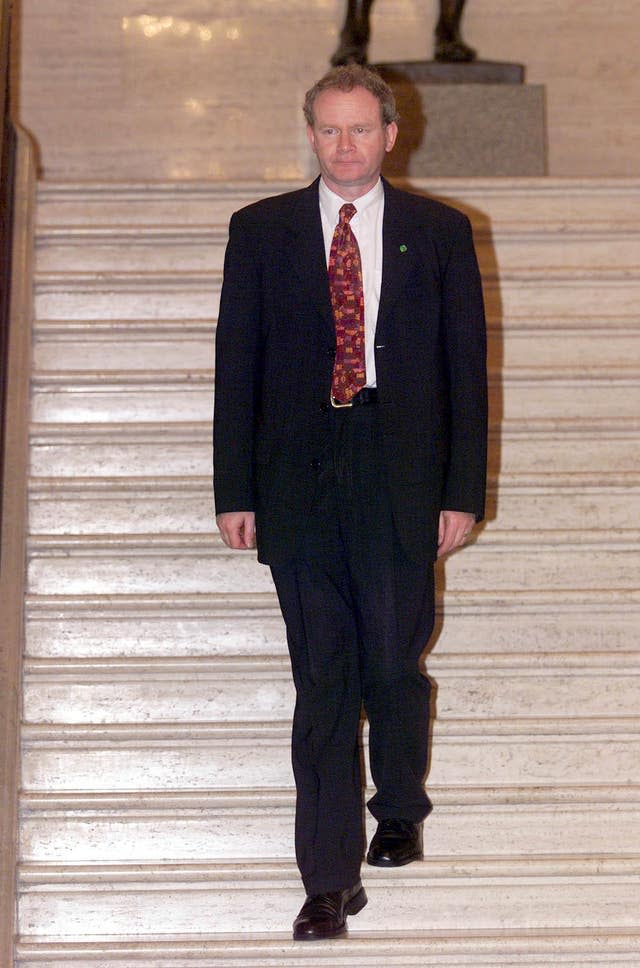Officials told not to ’embarrass’ schools with McGuinness visits, records reveal
A Stormont department was urged not to “embarrass” schools by asking them to host visits by new education minister Martin McGuinness amid a series of protests at his appointment, archives reveal.
The late former IRA commander’s installation as Sinn Fein minister for education in December 1999 prompted around 50 demonstrations in schools in mainly unionist areas in Northern Ireland, with some pupils walking out of classes to form pickets.
Newly released files from the Public Record Office of Northern Ireland include Department of Education (DoE) documents and correspondence related to the classroom boycotts.
One is a confidential briefing note sent to a senior DoE official by then chief inspector of schools Tom Shaw.
The document references one particular walkout at Kilkeel High School in Co Down and goes on to offer analysis on the wider protest activity.
“There is circumstantial evidence which suggests that the demonstrations by pupils are being orchestrated,” Mr Shaw wrote.
“Many of the protests have been preceded by pupils asking their peers to sign a petition objecting to the Minister, the pupils who are acting as organisers are quoting the same mis-information to persuade their peers to join them in protest (all pupils will be forced to learn Irish, play Gaelic games, attend integrate schools…); the spokespersons leading the protests use the same form of words and cliches; there are flags, banners etc in readiness when the protest begins; others, over school leaving age, turn up to support the protest; local, anti-agreement, politicians are soon on the scene, as are representatives of the Press.”
He said the demonstrations, however fleeting, were “damaging the morale and relationships within the schools affected”.
“They make it even more difficult to plan a programme of school visits for the Minister,” he added.
“I suspect that, for some time, many schools will be very reluctant to invite the Minister to functions, fearing a reaction of the kind being witnessed at present.”
Mr Shaw then relayed a conversation he had had with a representative of the Governing Bodies Association – an organisation that represents voluntary grammar schools in Northern Ireland.
“At last night’s function at Parliament Buildings, a GBA representative said he hoped the department would not embarrass schools by asking them to host a visit by the Minister.
“He said that the relaxed response of schools to such requests in the past would not be sustainable in current circumstances.
“It would take time, he judged, to establish trust and openness.”
In a separate document related to the same issue, Mr McGuinness made clear he would only attend schools he was invited to.
By January 2000, he said he had received invitations to 39 schools and had attended seven.
“I won’t impose a visit on any schools and will go only on the invitation of the school authorities,” stated a line prepared for attribution to the minister.
A departmental guidance document issued to schools on how to handle the protests warned staff that they should not attempt to prevent pupils leaving classes to take part.
“To attempt to restrain a pupil in this way could result subsequently in an allegation of false imprisonment,” it stated.

The guidance urged school leaders to contact the Royal Ulster Constabulary if they had information that a protest was being planned.
“The police at this stage will rely heavily on a school’s own assessment of the potential for disturbance,” it added.
The document said protests on school grounds should be supervised by staff.
“Supervision would reduce the possibility of the school being found negligent should a pupil get injured during such an incident,” it stated.
In terms of any engagement with the media, schools were told to refrain from saying “no comment” and avoid dodging questions, reading from scripts or getting angry with the interviewer.
The files also contain letters written by unionist Assembly members on the issue.
In one, former DUP MLA Iris Robinson raised concern that pupils taking part in a protest at Comber High School in Co Down were locked out when they tried to return to class.
Mr McGuinness replied refuting the claim and making clear pupils were not prevented from re-entering the school.
“I am disappointed that pupils felt the need to take this action but I can understand their concerns during this period of change,” he added.
In another letter, former Northern Ireland Unionist Party MLA Patrick Roche raised objections to Mr McGuinness’s appointment.
“Many parents and teachers are horrified by the appointment of the alleged former ‘overall commander’ of the IRA in Londonderry to the post of Minister of Education responsible for the education and welfare of their children,” he stated.
One piece of correspondence from the newly published papers is a letter of apology to the minister from a pupil at one school where a protest took place.
“It was an act which could have been peaceable but degenerated into supreme senselessness and I completely disassociate myself from it,” wrote the unnamed pupil.
“I hope you can find it in you to forgive these people who perpetrated such an incident, as I don’t believe that they are being led by anything other than indoctrination from the pessimistic surrounding world.”
In his reply, Mr McGuinness wrote: “I was disappointed at what happened at a number of schools but I have been greatly encouraged by the general level of support which I have received since my appointment as Minister for Education.
“I can understand that people may feel concerned during this momentous period of change.
“I am, however, totally committed to the fair and equal treatment of all the children here and will strive to ensure that they receive the best education possible.”


